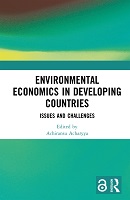Chapter 13 Household waste management and the role of gender in Nepal
Proposal review
Author(s)
Nepal, Mani
Cauchy, Marina
Karki Nepal, Apsara
Gurung Goodrich, Chanda
Language
EnglishAbstract
Solid waste management has become one of the most important issues in urban centres of developing countries where population growth puts pressure on public services. Nepal is struggling to manage municipal solid waste in urban centres due to a lack of segregation at the source, recycling, and proper disposal. This chapter examines whether women and men manage household waste differently at the household level, especially at source segregation, managing recyclable waste (paper and plastic), and composting degradable waste. Using household survey data from the Bharatpur Metropolitan City of Nepal, we find that women are more likely to segregate waste at the source and also manage degradable waste at home better. Still, there is no gender difference in selling plastic and paper waste. In contrast, women are more likely to give paper or plastic waste either to the waste collectors (free) or throw away, suggesting a heterogeneity across gender when it comes to managing household waste. In most cases, women waste managers perform well (segregating at source and composting degradable waste), but they do not seem to do well in all areas of plastic or paper waste management where some sort of sensitization may be helpful.
Keywords
Household waste, waste segregation, composting, recycling, gender rolesDOI
10.4324/9781003253884-18ISBN
9781032182919, 9781032384504, 9781003253884Publisher
Taylor & FrancisPublisher website
https://taylorandfrancis.com/Publication date and place
2022Imprint
RoutledgeClassification
Environmental economics
Development economics and emerging economies
Environmental policy and protocols
Society and culture: general


 Download
Download